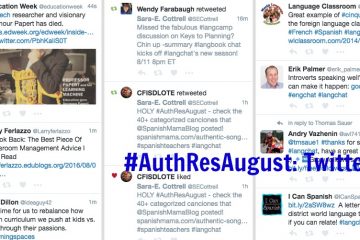
If there’s one big principle I’ve learned over the past 10 years, 8 teaching and 2 in grad school, it’s that good teaching isn’t magic. Sometimes it looks like magic, but it’s not. Sure, some people just don’t have the personality or gift of explanation to be a teacher. But some very gifted people have made very bad teachers throughout the history of education (I had some, didn’t you?). I wish there were some card trick I could learn that would make everything in my classroom effective and, well, magical, but if there is, I haven’t found it yet.
Enter #langchat, which started (and continues) as a Thursday-night professional development that is prompted by and dictated by its participants, all world language teachers, or somehow connected to the profession. Three colleagues on Twitter approached me through email… wow, is it a year ago?… to start the chat, and it’s blossomed into a useful hashtag that we use to share questions, answers, and links about teaching world language. The professionals who interact on #langchat have taught me so much more about good world language teaching than any bag of tricks could do.A couple of recent blog posts made me think, hey, perhaps it would be useful for me to reflect in the blogosphere on why I use #langchat, why we started it, and where it should go from here.
1) Twitter is an unfocused, messy medium, but I love it, and let’s make the most of it.
Twitter is anything but focused. Sometimes #langchat is like an open PD forum with pockets of teachers in the room, sitting at different tables, and a lot of chatter because there are seven different conversations going. (I think that’s happened at every conference I’ve ever been to.) I remember a couple of #langchats where we started out with the topic (which participants had chosen) and went off in so many directions I felt like we weren’t anywhere near what we were supposed to be talking about, and it was impossible to get back. But you know what? That’s okay. Because that’s where people were. That’s what they needed to talk about that night. And that’s what #langchat is about – it’s professional development that you need, when you need it, on the subject you need. If it doesn’t apply to you, skip it and see what’s happening next week.
2) Everyone has learned something from their journey, and everyone has the right to express what they’ve learned on #langchat. Please share yours with me.
Years ago, I remember telling my Spanish 3 students that I was going to try to speak in Spanish more in class (like, 10 minutes a class instead of nothing) and hearing them groan. I’d never even heard of ACTFL, much less their target input guidelines. That’s one thing I love most about teaching: we’re continually learning. I’ve learned so much more since college than I learned in college. I’m pretty sure I’ve learned more from our Twitter PLN in two years than I did in grad school.
I think all of us have that story – none of us has “arrived” at the final magic trick. Looking back at #langchat, personally that chat last year on authentic assessment picked me up by the collar and dumped me on my tail, so to speak, to show me I was relying too much on technology as assessment without thinking about whether or not the tasks were actually realistic or useful. And the PBL chat that @dr_dmd led – I thought I used PBL, but by the real definition, I almost never did. So I kept hammering him with questions, trying to figure out how PBL, authentic assessment, learner language, and input could interplay in the WL classroom, and came away determined to change up our major fall project in Spanish 3. I still don’t know how I feel about PBL in the WL classroom as a major vehicle of learning, but just this last week my students benefited from what I learned from Don in that chat, and that’s now part of my journey.What’s your journey? What have you learned? Whatever it is – in whatever format or area – share it, not just on Thursday evenings, but like we all do, throughout the week using the hashtags #langchat, or #flteach, or #spanishteachers, or #apfrench, or any number of others!
3) Everyone deserves respect, face-to-face and online. Respect me, and give me the benefit of the doubt. Bring problems with me, to me.
I am the type of teacher who learns about something and then throws caution to the wind and jumps in head-first. Four years ago I went to a TPRS workshop on a Thursday night and then Monday morning we pretty much threw our textbooks out the window (okay, it was a little slower than that). Then it was like God put me working with people who were the exact opposite: ‘okay, let’s get my feet wet a little bit here; okay, that worked pretty well, maybe next year I’ll go a little deeper.’ To balance my personality or something.
What I’ve learned from working with them is what has been mentioned here–it’s a journey and you never know what will motivate someone toward the next step on their path. From my perspective, many times I’m looking back on my own practices and asking, “Why didn’t I see how terrible my idea was?” and I wonder if that comes off on Twitter as sounding like, “Why can’t you see your idea is terrible?” if someone is doing something similar. 140 characters of digital type is a tough medium to communicate what we’ve learned.
That shouldn’t make us give up; on the contrary, I suggest two responses: 1) I determine to remember that we’re all worthy of respect and edifying speech and 2) I determine to remind myself that if I’m offended it’s more than likely I’ve misread what the person was trying to communicate and I should ask for clarification from that person until we’ve worked it out.
4) Respect is not the same thing as agreeing or affirming everything. I may be wrong, but…
But nothing! Call me out! Well, respectfully, but still, please don’t affirm my bad ideas and call it respect, right? I look back and think, what would I have learned if people hadn’t questioned what I was doing? There’s one colleague in particular who has the mildly annoying habit of consistently asking me why I do a certain activity or assign some work or teach some unit or whatever. But the only reason it’s mildly annoying is that frequently I’m just flat wrong, and there’s no good pedagogy behind what I’ve done, and I’m immensely grateful that I have someone like that who keeps me professionally sound.
As one more personal example, it’s no secret I try to keep translation out of my classroom as much as possible and that makes me not exactly a TPRS teacher, but it’s also no secret that I think TPRS is one of the most revolutionary improvements to come to language learning in the last century, and I think Kristy (@placido) must be an amazing teacher I’d love to live closer to so I could observe her.
5) #langchat is intended to bring together a wide range of educators to foster the best exchange possible.
One of the most popular education chats on Twitter, #edchat, is so large that people blog about it being too large, and has broken up into two separate chats. And lots of area-specific chats have spun off from it. #langchat, so far, has not had the level of participation that would productively produce even more focused chats, in my opinion. That’s not to say it couldn’t. If educators want to spin off age-level focused chats, they should feel free. If a couple of educators hadn’t had the idea to get some language teachers together to chat on Thursday nights, we wouldn’t have #langchat. So what’s your idea? Where do you want to go – and do you want to lead others there? Go for it!
You can follow me on Twitter at @secottrell. Join us Thursday evenings at 8 Eastern, 7 Central for the best professional development around, #langchat. (Tweetdeck and tweetchat are useful tools for organizing and following #langchat tweets.)
3 Comments
Comments are closed.




Thanks as always for your wisdom and advice to us! I am so glad that I met you and found #langchat. It has absolutely changed everything about how I teach and why I teach what I do. And, I am beginning to see those results from the work I have put in to make those changes. Without #langchat, I would have probably never made those needed changes. I also needed to hear your critical look at being respectful and edifying to all now matter whether on #langchat or in a department meeting. (I love the way the Lord show us our sin multiple times until we get it and repent!) Thanks for everything! See you tomorrow night on #langchat! @klafrench
This comment has been removed by the author.
Excellent summary of the importance of preparing our students for their future, wherever it may lead. Thanks as always for sharing your thoughts!